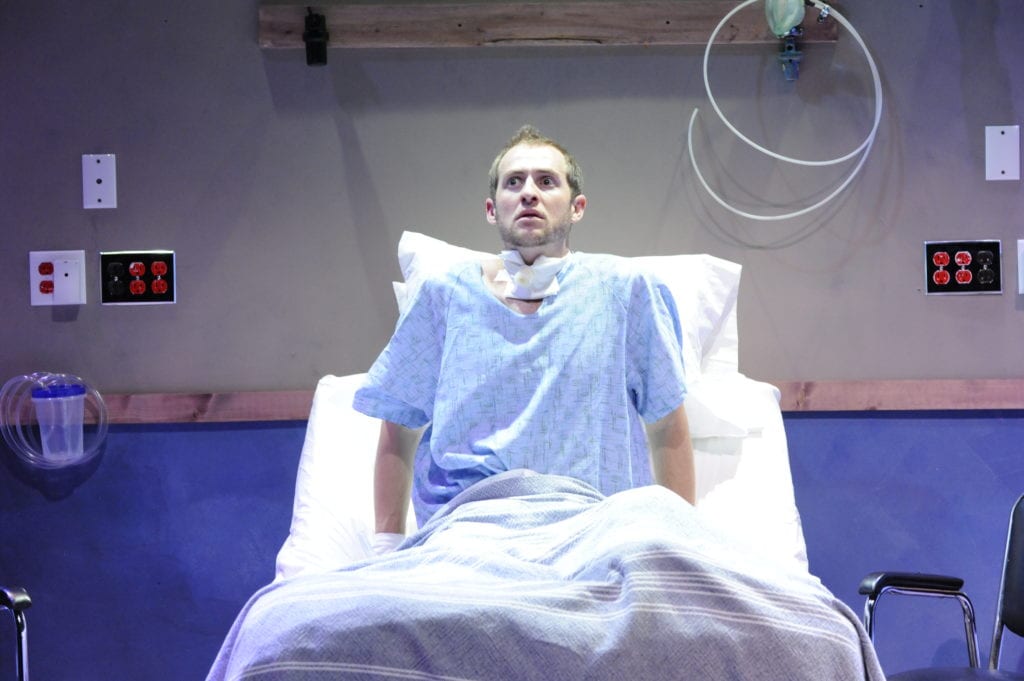
By Juliet Wittman, Westword Magazine (Read the original.)
A man in a hospital bed is having a lively conversation with the woman sitting in a chair by his side. Amid all kinds of teasing and laughter, Sander explains how he came to be injured: something about the scent of a certain perfume, taking an elevator he’d been warned about, losing a foot, a moment’s lightness — and sudden, excruciating pain. The woman’s response seems oddly unfeeling, but we have no way of parsing their relationship; perhaps that’s just how this couple deals with the horrific. But then we find out that the man is in a coma, and the woman, Jackie, is neither his wife nor his girlfriend, both of whom will soon make their entrances.
Full Code is a new script by David Valdes Greenwood, workshopped with the Boulder Ensemble Theatre Company as part of the Generations new-play development program (a competition open to playwrights with children under eighteen) and now receiving its world premiere. The story unfolds through a mingling of Sander’s fevered dreams and the actual events taking place in his hospital room; in the hallway outside, with its bench and vending machine; and in the hospital chapel. Here nurse Dennis (a gentle Warren Sherrill) sometimes comforts Lauren, a religious young woman who has been Sander’s intimate friend and intends to be his lifelong partner, though she insists they have never been sexually intimate. In the corridor, Dennis advises Sander’s wife, Callie, an engineer back from business in Mexico; Lauren and Callie wait, alone or together, while tension hums between them; and Dr. See pulls Callie aside for consultations and to ask, to her shock and distress, if she’s considered organ donation.
The play’s title refers to a contentious issue: Callie and Sander had both written do-not-resuscitate living wills, but at the hospital, Callie discovers that as a result of Lauren’s influence, Sander is now listed as full code, which means that all medical means will be employed in an emergency. But if we’re expecting the kind of drama that surrounded the Terry Schiavo case in Florida, that’s not what Greenwood has in mind. What fascinates him is the coma itself, that strange state in which, as Dennis explains, patients can experience almost anything, from an awareness of all that’s happening around them to a rich stew of memories and associations, to nothing but cold blackness.
Through the first act, I found myself intrigued, because the topic is fascinating and the script thoughtful and original — but I wasn’t emotionally involved. In part, this might have been the sense of distance communicated by the clean, strong lines of the elegantly minimal set, but there are also problems with performance. The richest characters are Lauren and Callie, and I just couldn’t find Maire Higgins’s Lauren convincing. Callie, as tough and impermeable as Lauren is chirpy and sentimental, is played by the always excellent Laura Norman. Tall, angry and prickly, she’s suppressing her feelings, and the scenes between the two women seem oddly muffled. And although we understand that there are depths to the relationship between Callie and Sander (a convincing Casey Andree), we don’t feel them.
In the second act, however, the themes raised in the first click into place, and the pace picks up. The sick man’s imaginings become more fantastical. There’s a wrenching scene (well played by Luke Sorge and Devon James) that shows exactly what recovery from a coma can entail. A tense, bristling encounter between Karen Slack’s vivid Jackie and Callie electrifies, and reveals the reasons for Jackie’s strange ambiguous behavior in the first scene, her angry laughter, the way her image lingers in Sander’s mind. Most important, Norman starts revealing who Callie really is, that behind the withholding exterior there’s a woman of extraordinary strength and determination: “I once built a hospital out of the remains of a cliff face that had collapsed in a small village,” she says. “No other firm would take the job, but I went to the site, and somehow I knew I’d never find anything stronger than the rubble. It’d done all the falling it was going to do.”
The ending is unexpected (though the moment it happens, you realize it was inevitable), and the way Greenwood brings all of his threads together is the mark of a talented and invested playwright.
